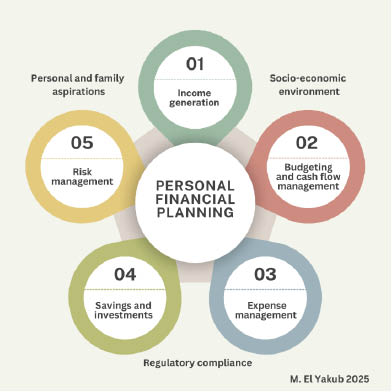Personal Financial Planning – Earning Income (II)
In trying to understand income, last week we discussed knowledge about the income source(s) and our ability to seize opportunities by successfully putting in the required effort and resources. Today, we will take up personal, legal, and/or other subjective limitations and/or restrictions, and begin to discuss income sources. Personal, legal, and/or other subjective limitations […]

personal financial planning
In trying to understand income, last week we discussed knowledge about the income source(s) and our ability to seize opportunities by successfully putting in the required effort and resources. Today, we will take up personal, legal, and/or other subjective limitations and/or restrictions, and begin to discuss income sources.
Personal, legal, and/or other subjective limitations and/or restrictions: Knowledge about the income source(s) and our individual ability to seize the opportunity by successfully putting in the required resources are important in earning income. These largely influence and/or shape what sources of income we can or would want to pursue. It is important to understand these factors so that we can prepare ourselves sufficiently for whatever it is that we want to do to earn income.
But beyond knowledge about the income source(s) and our individual abilities, there are personal, legal, and other subjective issues that can influence and/or shape what we can engage in in pursuit of income. For one, personal dispositions, interests, and of course capacities as mentioned, do shape what we can or should be able to do. For instance, no matter how interested we may be in an income-earning activity if we do not have the personal capacity to successfully pursue it, then we shouldn’t unless and until we build requisite capacities. So, if you want to begin to invest in company shares for purposes of earning dividends and gaining capital growth, it is crucial you first educate yourself on the workings of the economy, the operations of the stock market, the markets and opportunities of the individual companies that you may wish to invest in, etc. These are imperative to enhance your chances of success in the field.
Furthermore, legality is another crucial factor in deciding what we can engage in to earn income. If I were writing the factors in some priority order, I would put legality right at the top. This is because whatever we can do to earn income must first be legitimateand it must also be pursued in only legitimate ways. ‘The end justifies the means’ is not a maxim we should live by on earning legitimate income and how we go about doing that. Any activity that is criminal to engage in must not even be up for consideration as an incoming-making opportunity. In addition, sometimes legality might be tied to a jurisdiction. For instance, eating and selling kola nut in Nigeria and most African countries is legitimate. But some Middle Eastern countries ban their importation and sale into their countries. This means whilst we may engage in commercial activities with kola nut in Nigeria, we cannot plan to do that in say, Saudi Arabia. Beyond legality, I also strongly suggest that we should even not do anything that may be legitimate in a jurisdiction but may hurt others. For instance, some businesses can have lasting negative impacts on our environment. I think, going into such businesses should be well-thought and avoided if possible. If engaging in such income-earning activities is feasible, then the legality rule should be fully complied with.
Subjective norms are another important factor to consider in making our choices about income-earning sources. A subjective norm refers to an individual’s perception of what the important people in their life expect them to do about certain things. Essentially, therefore, a subjective norm is the social pressure or endorsement that we feel as individuals to do certain things and/or behave in a particular way or ways. Subjective norms are based on our beliefs about the approvals or disapprovals of the significant persons to us on issues.
From our childhood to adulthood, at least some chunk of our thinking and behavior is shaped by what we learn from others; what their expectations of us are, etc. Consequently, our choices of what we can do to earn income may be influenced, positively or negatively, by these expectations. For persons of my generation that were born between 1960 and 1975, many of our parents who were employees in the government or private sector did somehow influenced our choice of careers to be employees in government or private sector. Similarly, those whose parents and larger families were essentially in private businesses were also somehow influenced to go into private business. At the end of everything, understanding what subjective pressures we may be under is important in making it possible for us to identify what we deeply want to do (that we are good at and which provides us with legitimate income-making opportunities) rather than just following crowd, that may or may not be right and best for us.
Types of income sources:A good friend recently asked me to advise him on specifically what to do to make money. I told him that I wouldn’t. What I do know is that our country is blessed with multitudes of ways to commercially create value and wealth for different people in different socio-economic strata of our society. Often what we lack is the willingness to think deeply through potential opportunities and what we can do to turn them into reality and success. Another issue is that many of us simply refuse to have the stamina and staying power required to turn the potentials into success over time, making all the sacrifices that are required and necessary. We tend to always want success in 90-day cycles at the most. Until we begin to commit to having long-term perspectives to making money, our options will continue to be limited to low-value-added activities from which we can always easily decommit at the slightest pushback.
Next week, we will take up types of income-making sources.
